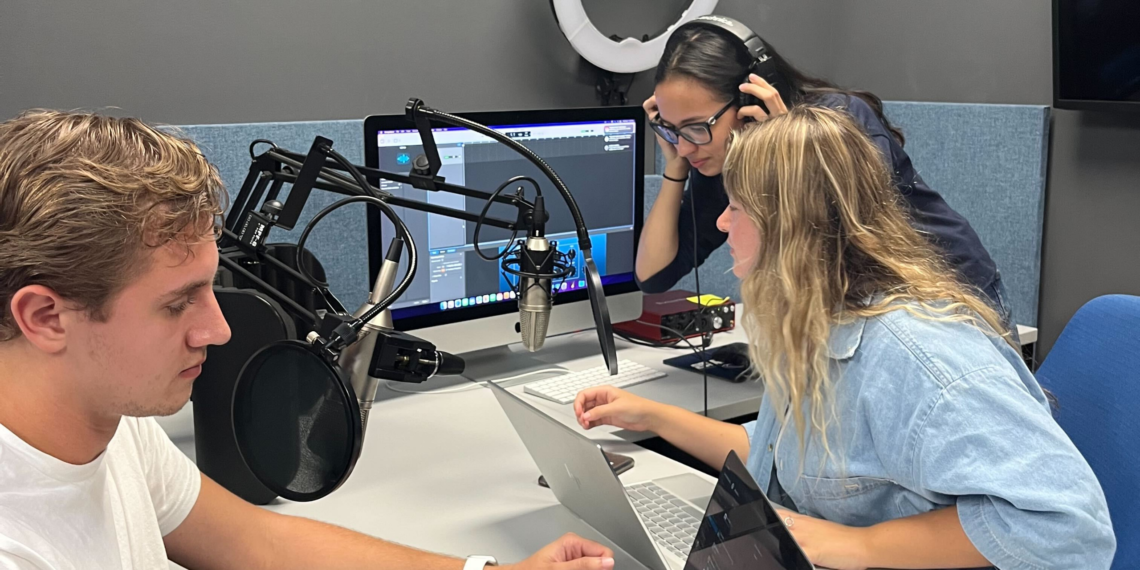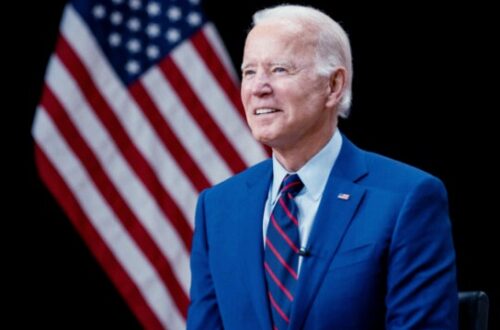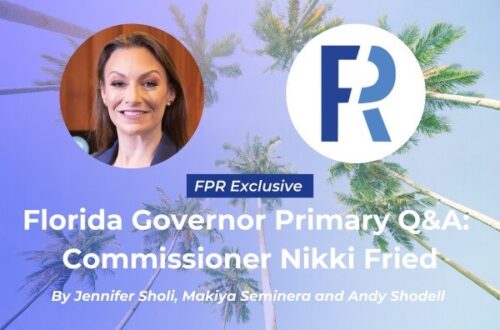Below is the transcript of our most recent Florida Politics, Reviewed podcast, available on Spotify, Apple Podcasts, or wherever you get your podcasts. Give it a listen!
KATHERINE MARIN: Hello and welcome to Florida Politics, Reviewed. I’m your host Katherine Marin. This is a podcast out of Florida Political Review, Florida’s preeminent student political journal. For more in-depth coverage of Florida politics, visit our website floridapolicalreview.com, and follow us on Twitter @FlaReview.
NORA O’NEILL: I’m Nora O’Neill, and here’s your rapid fire news for the week. From Florida Political Review, be sure to check out our opinion articles “The University of Florida is Partisan” and “DeSantis Plays Chess Using Migrants as Pawns.” Some things to keep your eye on in Florida politics – Senator Marco Rubio is asking for thirty three billion dollars in disaster relief for Florida after Hurricane Ian. The figure breaks down to twelve billion for damages and flood control, one billion for pollution, and ten billion to add to the federal emergency management agency’s relief fund. Republican Senator Ben Sasse made big waves at the University of Florida after being named the sole finalist in the university’s search for a new president. He held a forum October 10th to meet with faculty and students, and was instead greeted with hundreds of student protesters begging him to get his ‘Sasse Out of the Swamp.’ A federal court judge upheld the state’s ban on covering gender affirming care with Medicaid on October 12th. The rule went into effect August 21st and denies any procedures relating to primary or secondary sexual characteristics. Meanwhile, the Florida Board of Medicine is struggling to adopt a standard of care for transgender patients. A new 2022 WalletHub study recently found Florida was second to last in overall voter registration. There’s not much time to get that number up, as the voter registration deadline for Florida’s midterm elections passed October 11th. It also ranks Florida forty-second in the nation for voter turnout in the 2020 election. And as we know, those November 8 midterms are quickly approaching stay informed with FPR’s coverage.
THOMAS VINCENT: On behalf of FPR, we would like to acknowledge and extend our deepest sympathies to those who are dealing with the impacts of Hurricane Ian. Members of the community who want to help those in need can do so in a variety of ways, including the American Red Cross and the Florida Disaster Fund. People may also donate to Aid-a-Gator, which provides funding to students experiencing unanticipated expenses due to emergency situations. With that said, here’s Florida Politics, Reviewed.
KATHERINE MARIN: Coming to you live from the Hub, I’m Katherine and today I’m here with Scott Howard, writer of “DeSantis Plays Chess Using Migrants as Pawns.” Scott, how are you today?
SCOTT HOWARD: I’m doing very well. Thank you.
KATHERINE MARIN: Alright, so let’s get into it. On September 14th, we saw something we had never really seen before here in Florida, and we’ve seen a lot here in Florida! What can you tell me about the situation at Martha’s vineyard? How did it start?
SCOTT HOWARD: The situation at Martha’s vineyard began when Governor DeSantis had forty-eight migrants flown from Texas to Martha’s vineyard in an attempt to raise awareness about the border crisis. We recently ran over two million migrant encounters this year, which has been unprecedented and so DeSantis had forty-eight migrants flown as sort of a political ploy as well because Martha’s Vineyard is notoriously democratic. It caused a national uproar.
KATHERINE MARIN: And did these migrants have any directions, any kind of assistance when they arrived at Martha’s Vineyard?
SCOTT HOWARD: No, they were essentially just dropped off in the middle of the street from what everybody could tell. There were suggestions they had been given pamphlets beforehand that said they would have jobs and opportunities when they got there. There were no job opportunities. The pamphlets, if they existed, were lies. And the migrants were just left in the middle of the town with no direction.
KATHERINE MARIN: And did they actually even know where they were going?
SCOTT HOWARD: No. These migrants had zero clue where they were being flown to. They were lied to in some cases, reportedly. They were told they were just going somewhere with jobs and their legal claims could be filed better. But that was not the case.
KATHERINE MARIN: Now there was pushback against the relocation of these migrants…Can you talk to us about who is challenging the Governor’s move?
SCOTT HOWARD: So there are two main legal cases going on that involve this – as far as I’m aware – there may be more. Some of the migrants themselves are suing in Massachusetts. The claim is that their fourth and fourteenth amendment rights have been violated. So I think a judge has granted standing to that, but we’ll see how far that case goes. Also in Texas itself, in the country from which these migrants originated, the county sheriff has launched an investigation into whether these migrants were lied to and whether the law was broken in moving them. So he hasn’t named DeSantis by name, but the implication is that DeSantis will be involved.
KATHERINE MARIN: Now you mention, Aside from your obvious argument that what happened was inhumane regardless of your stance on border control, “a relocation program for unauthorized aliens” doesn’t exactly fit this situation? Why not?
SCOTT HOWARD: So the program in question that that quote comes from was authorized by the state legislature this last July. And the program is authorized to move illegal aliens from the state of Florida to this. That phrasing has no application here for two main points. These migrants are not here unauthorized. They are all asylum seekers. Their claims for asylum had all been filed. And they were awaiting trial when the move happened. And second, these migrants were not from Florida itself. All forty-eight of them were from Texas.
KATHERINE MARIN: You say that the relocation program was “a political stunt”. What do you think is the strategic reasoning behind the governor’s recent actions? Is there some kind of higher office in play?
SCOTT HOWARD: Yes, for those who really follow electoral politics, especially inside the republican party, it’s been no secret for about a year now that Governor DeSantis has his eyes on a run for higher office come 2024. Specifically, the presidency. This move as a political stunt was meant to raise his national profile and to make him look good in the eyes of the republican base voters that he’s going to need to win the primary.
KATHERINE MARIN: Thank you so much Scott.
THOMAS VINCENT: I’m with Gianna Brock, writer of “Florida Voter Fraud Arrests Sparks Calls for Reform.” Gianna, how are you doing?
GIANNA BROCK: I’m good. Great to be here.
THOMAS VINCENT: That’s good. Alright so let’s just jump right in. So Gianna what happened here?
GIANNA BROCK: Alright, so in about mid August. Actually, August 18th. There was a coordinated arrest. It was a combination of the efforts of the Florida Office of Elections, Crimes, and Security and the FDLE, which is our state police and they had a coordinated investigation in which they found about twenty individuals who were on the voting rolls illegally. And they had found that they voted illegally in the 2020 election and so on August 18th, there was actually a coordinated arrest of these individuals all across the state.
THOMAS VINCENT: Wow okay so what are the potential consequences for those that were arrested?
GIANNA BROCK: So as of now, they are facing a five thousand dollar fine and up to five years in prison because it actually is a third-degree felony.
THOMAS VINCENT: Wow okay, so can you tell me about amendment four here. Because I believe that has something to do with this, doesn’t it?
GIANNA BROCK: With the actual arrests, technically it doesn’t. If you talk to people from the state. Like I spoke to Mark Ard who is the director of external operations for the Florida Department of State, and the official statement is that it really doesn’t. But if you look at it from the perspective of those who have been arrested, it actually does have a lot to do with it. Because they were actually under the impression that because of amendment four they were actually allowed to vote. Amendment four was something that was passed by the Florida legislature in 2018, and actually restored the right to vote for felons under specific conditions. And some of those conditions were that if they were nonviolent felony offense that they committed so they couldn’t have been a murderer or a rapist. And the other thing too is that any fines or fees that they owed had to have been paid. Now the unfortunate thing is that there’s not really a set way for some of these convicted felons to know if they actually qualify. So some people were approached by different organizations who were trying to get people to register to vote and they said ‘Oh, I’m a convicted felon’ but they said ‘No, no it’s okay. Under amendment four you actually can vote. But they didn’t know because you don’t want to go up to someone on the street and go: ‘Oh are you a murderer? Are you a rapist? That can be a very uncomfortable situation. So they just assumed that the person was a nonviolent convicted felon and so then they did register. They went to the DMV or maybe online, filled out the application. And now here’s where the part is where they actually committed a crime. There’s actually a box that if you have to check where it certifies that you are allowed to vote. That you are a convicted felon and your rights have been restored or you are not a convicted felon. So they checked a box saying my rights have been restored. Now you’re lying on this document. That’s where voter fraud comes in.
THOMAS VINCENT: I see and does this have to do with the fees. Did they not pay off their fees beforehand? Is that why amendment four did not apply to them?
GIANNA BROCK: Again, because it’s twenty individuals, it’s kind of a myriad of things. For the majority of them, it’s that they were actually convicted of violent offenses and that’s why they didn’t qualify.
THOMAS VINCENT: Right. Okay. Gotcha. Are they able to do anything about this? Is anyone trying to help them get through this? What’s happening here?
GIANNA BROCK: Yeah so this was a very traumatic and stressful time for these people. These are people who went to prison and that in their mind paid their respects and are now a member of our community. And a lot of the time it was actually a heavy police presence. It was SWAT. It was very early in the morning. There was children. They have families. And they’re kind of being arrested, dragged out of their homes in the early wees of the morning. Their neighbors are seeing. I mean it was definitely a traumatic experience for them. Luckily though, there is the FFRC, which is the Florida Rights Restoration Committee. I was actually able to speak with their deputy director Neil Voltz. From the beginning they were raising money and helping to pay bail for some of these individuals, as well as make sure that they are getting proper legal counsel because they are facing crimes and they will have to appear in court.
THOMAS VINCENT: Wow okay thank you so much for coming on, Gianna. It was good to see you.
GIANNA BROCK: Thank you so much. Thanks for having me.
KATHERINE MARIN: And now I’m with Maria Varas, writer of “Nebraska Senator Ben Sasse named finalist for University of Florida President.” Maria, how are you?
MARIA VARAS: I’m doing great. Thank you.
KATHERINE MARIN: Great so who exactly is our new President-to-be?
MARIA VARAS: Our new president-to-be, as of now, will most likely be Nebraska Senator Ben Sasse. Before becoming a senator in the mid two thousands, he went to Harvard, Yale. He, in total, holds five different degrees and what has been widely reported is the fact that he was president of a Nebraska private university called Midland University, for five years.
KATHERINE MARIN: And what exactly can you tell us about his departure from congress?
MARIA VARAS: So in regards to his departure. If the UF Board of Trustees accepts Sasse, then he plans to reign from the U.S. Senate. This is pretty notable because he was recently reelected in 2020 and so, his term would have ended in around 2027. And so, his early resignation…a lot of people are speculating that his early resignation is influenced by the fact that he was one out of seven republican senators to vote to convict Trump after the 2021 January 6 capitol riots. In fact, his resignation is a growing trend of congressional republicans who have voted to impeach or convict Trump and say a growing trend of their fate, as we are seeing in this year’s midterms. The House republicans who voted to impeach Trump have been losing their primaries. Very notably, Liz Cheney. And so yeah, very notable because it’s an early resignation.
KATHERINE MARIN: And why do you think there’s been so much backlash against the choice that’s been made, but also the process in which it was made?
MARIA VARAS: Well yeah in terms of the backlash this past Monday when Senator Ben Sasse arrived at UF’s campus for a Q&A, students showed up to protest. Specifically, over three hundred students were present. This protest was organized by various student groups and unions. So many people arrived that the Q&A had to be ended early and Sasse had to be escorted out. And he had to complete the Q&A via livestream in private. In terms of specifically what students were protesting against, since Sasse is a senator his political beliefs are very out in the open. Very easy to access. And it has been widely pointed out that Sasse’s views on marriage, on LGBT issues – he believes that marriage is between a man and a woman. He has spoken out against the Supreme Court legalizing same-sex marriage in Obergefell v. Hodges. In terms of abortion, he is pro-life. He has mentioned multiple times and discussed multiple times his pro-life beliefs. So those are some social issues there that a lot of students hold a lot of concern over. In terms of the process in which he was selected, that has been very widely discussed. This past legislative session, the Florida congress voted on a bill that was signed on by DeSantis that would make university presidential searches private, so outside of regular public recording laws. So, virtually the whole process of the presidential search committee selecting Ben Sasse has been done in secret. I mean there were 699 other candidates considered, and we only know of Sasse. So a lot of students have expressed concern that the whole process was political, partisan and that they want to see more of how the process played out.
KATHERINE MARIN: Thank you so much Maria.
MARIA VARAS: No problem.
THOMAS VINCENT: That’s it for the show today. Be sure to stay updated on all things Florida politics by visiting our website FloridaPoliticalReview.com. Thanks for listening to Florida Politics, Reviewed.
Check out other recent articles from the Florida Political Review here.





